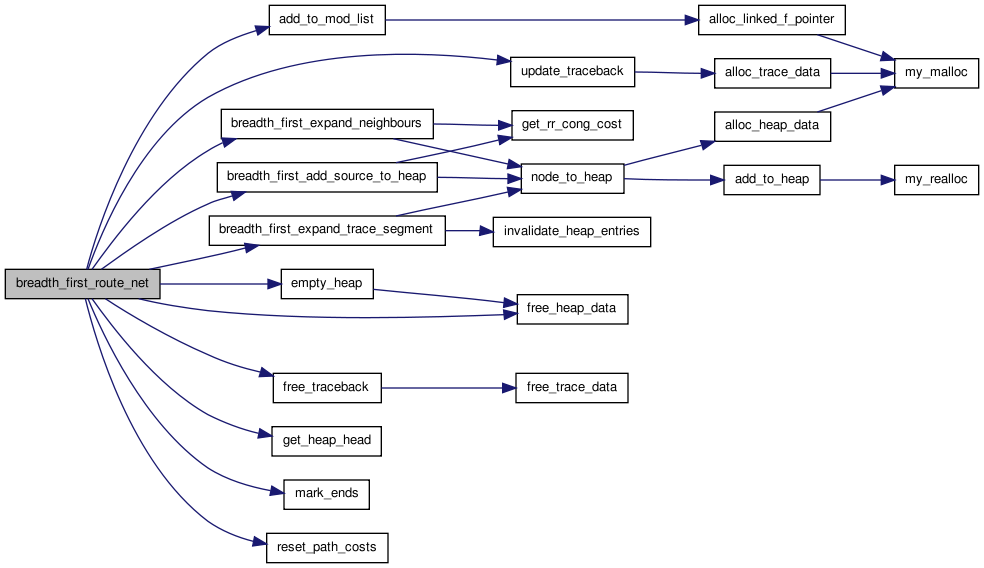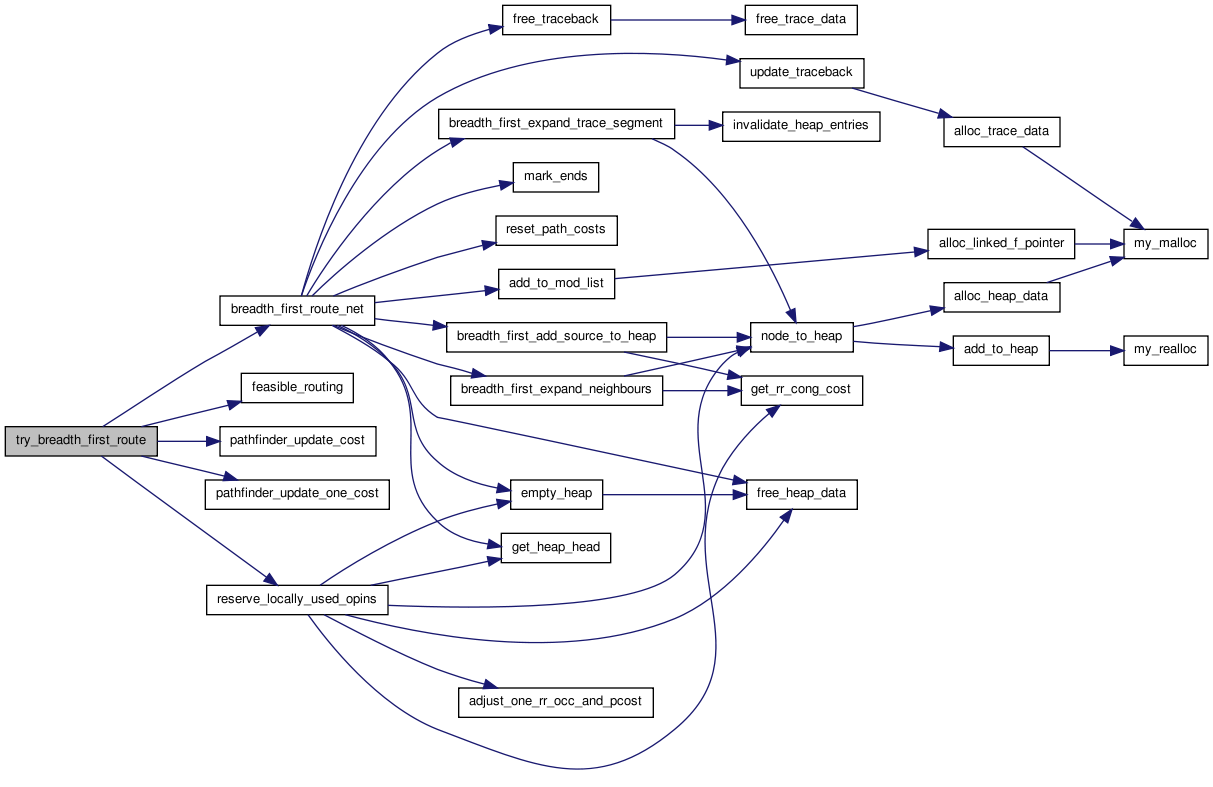vpr/SRC/route/route_breadth_first.c File Reference
#include <stdio.h>#include "util.h"#include "vpr_types.h"#include "globals.h"#include "mst.h"#include "route_export.h"#include "route_common.h"#include "route_breadth_first.h" Include dependency graph for route_breadth_first.c:
Include dependency graph for route_breadth_first.c:Go to the source code of this file.
Functions | |
| static boolean | breadth_first_route_net (int inet, float bend_cost) |
| static void | breadth_first_expand_trace_segment (struct s_trace *start_ptr, int remaining_connections_to_sink) |
| static void | breadth_first_expand_neighbours (int inode, float pcost, int inet, float bend_cost) |
| static void | breadth_first_add_source_to_heap (int inet) |
| boolean | try_breadth_first_route (struct s_router_opts router_opts, t_ivec **clb_opins_used_locally, int width_fac) |
Function Documentation
| static void breadth_first_add_source_to_heap | ( | int | inet | ) | [static] |
Adds the SOURCE of this net to the heap. Used to start a net's routing.
Definition at line 337 of file route_breadth_first.c.
{
int inode;
float cost;
inode = net_rr_terminals[inet][0]; /* SOURCE */
cost = get_rr_cong_cost(inode);
node_to_heap(inode, cost, NO_PREVIOUS, NO_PREVIOUS, OPEN, OPEN);
}
 Here is the call graph for this function:
Here is the call graph for this function: Here is the caller graph for this function:
Here is the caller graph for this function:| static void breadth_first_expand_neighbours | ( | int | inode, |
| float | pcost, | ||
| int | inet, | ||
| float | bend_cost | ||
| ) | [static] |
Puts all the rr_nodes adjacent to inode on the heap. rr_nodes outside the expanded bounding box specified in route_bb are not added to the heap. pcost is the path_cost to get to inode.
Definition at line 298 of file route_breadth_first.c.
{
int iconn, to_node, num_edges;
t_rr_type from_type, to_type;
float tot_cost;
num_edges = rr_node[inode].num_edges;
for(iconn = 0; iconn < num_edges; iconn++)
{
to_node = rr_node[inode].edges[iconn];
if(rr_node[to_node].xhigh < route_bb[inet].xmin ||
rr_node[to_node].xlow > route_bb[inet].xmax ||
rr_node[to_node].yhigh < route_bb[inet].ymin ||
rr_node[to_node].ylow > route_bb[inet].ymax)
continue; /* Node is outside (expanded) bounding box. */
tot_cost = pcost + get_rr_cong_cost(to_node);
if(bend_cost != 0.)
{
from_type = rr_node[inode].type;
to_type = rr_node[to_node].type;
if((from_type == CHANX && to_type == CHANY) ||
(from_type == CHANY && to_type == CHANX))
tot_cost += bend_cost;
}
node_to_heap(to_node, tot_cost, inode, iconn, OPEN, OPEN);
}
}
 Here is the call graph for this function:
Here is the call graph for this function: Here is the caller graph for this function:
Here is the caller graph for this function:| static void breadth_first_expand_trace_segment | ( | struct s_trace * | start_ptr, |
| int | remaining_connections_to_sink | ||
| ) | [static] |
Adds all the rr_nodes in the traceback segment starting at tptr (and continuing to the end of the traceback) to the heap with a cost of zero. This allows expansion to begin from the existing wiring. The remaining_connections_to_sink value is 0 if the route segment ending at this location is the last one to connect to the SINK ending the route segment. This is the usual case. If it is not the last connection this net must make to this SINK, I have a hack to ensure the next connection to this SINK goes through a different IPIN. Without this hack, the router would always put all the connections from this net to this SINK through the same IPIN. With LUTs or cluster-based logic blocks, you should never have a net connecting to two logically-equivalent pins on the same logic block, so the hack will never execute. If your logic block is an and-gate, however, nets might connect to two and-inputs on the same logic block, and since the and-inputs are logically-equivalent, this means two connections to the same SINK.
Definition at line 220 of file route_breadth_first.c.
{
struct s_trace *tptr, *next_ptr;
int inode, sink_node, last_ipin_node;
tptr = start_ptr;
if(remaining_connections_to_sink == 0)
{ /* Usual case. */
while(tptr != NULL)
{
node_to_heap(tptr->index, 0., NO_PREVIOUS, NO_PREVIOUS,
OPEN, OPEN);
tptr = tptr->next;
}
}
else
{ /* This case never executes for most logic blocks. */
/* Weird case. Lots of hacks. The cleanest way to do this would be to empty *
* the heap, update the congestion due to the partially-completed route, put *
* the whole route so far (excluding IPINs and SINKs) on the heap with cost *
* 0., and expand till you hit the next SINK. That would be slow, so I *
* do some hacks to enable incremental wavefront expansion instead. */
if(tptr == NULL)
return; /* No route yet */
next_ptr = tptr->next;
last_ipin_node = OPEN; /* Stops compiler from complaining. */
/* Can't put last SINK on heap with NO_PREVIOUS, etc, since that won't let *
* us reach it again. Instead, leave the last traceback element (SINK) off *
* the heap. */
while(next_ptr != NULL)
{
inode = tptr->index;
node_to_heap(inode, 0., NO_PREVIOUS, NO_PREVIOUS, OPEN,
OPEN);
if(rr_node[inode].type == IPIN)
last_ipin_node = inode;
tptr = next_ptr;
next_ptr = tptr->next;
}
/* This will stop the IPIN node used to get to this SINK from being *
* reexpanded for the remainder of this net's routing. This will make us *
* hook up more IPINs to this SINK (which is what we want). If IPIN *
* doglegs are allowed in the graph, we won't be able to use this IPIN to *
* do a dogleg, since it won't be re-expanded. Shouldn't be a big problem. */
rr_node_route_inf[last_ipin_node].path_cost = -HUGE_FLOAT;
/* Also need to mark the SINK as having high cost, so another connection can *
* be made to it. */
sink_node = tptr->index;
rr_node_route_inf[sink_node].path_cost = HUGE_FLOAT;
/* Finally, I need to remove any pending connections to this SINK via the *
* IPIN I just used (since they would result in congestion). Scan through *
* the heap to do this. */
invalidate_heap_entries(sink_node, last_ipin_node);
}
}
 Here is the call graph for this function:
Here is the call graph for this function: Here is the caller graph for this function:
Here is the caller graph for this function:| static boolean breadth_first_route_net | ( | int | inet, |
| float | bend_cost | ||
| ) | [static] |
Uses a maze routing (Dijkstra's) algorithm to route a net. The net begins at the net output, and expands outward until it hits a target pin. The algorithm is then restarted with the entire first wire segment included as part of the source this time. For an n-pin net, the maze router is invoked n-1 times to complete all the connections. Inet is the index of the net to be routed. Bends are penalized by bend_cost (which is typically zero for detailed routing and nonzero only for global routing), since global routes with lots of bends are tougher to detailed route (using a detailed router like SEGA). If this routine finds that a net *cannot* be connected (due to a complete lack of potential paths, rather than congestion), it returns FALSE, as routing is impossible on this architecture. Otherwise it returns TRUE.
Definition at line 129 of file route_breadth_first.c.
{
int i, inode, prev_node, remaining_connections_to_sink;
float pcost, new_pcost;
struct s_heap *current;
struct s_trace *tptr;
free_traceback(inet);
breadth_first_add_source_to_heap(inet);
mark_ends(inet);
tptr = NULL;
remaining_connections_to_sink = 0;
for(i = 1; i <= clb_net[inet].num_sinks; i++)
{ /* Need n-1 wires to connect n pins */
breadth_first_expand_trace_segment(tptr,
remaining_connections_to_sink);
current = get_heap_head();
if(current == NULL)
{ /* Infeasible routing. No possible path for net. */
reset_path_costs(); /* Clean up before leaving. */
return (FALSE);
}
inode = current->index;
while(rr_node_route_inf[inode].target_flag == 0)
{
pcost = rr_node_route_inf[inode].path_cost;
new_pcost = current->cost;
if(pcost > new_pcost)
{ /* New path is lowest cost. */
rr_node_route_inf[inode].path_cost = new_pcost;
prev_node = current->u.prev_node;
rr_node_route_inf[inode].prev_node = prev_node;
rr_node_route_inf[inode].prev_edge =
current->prev_edge;
if(pcost > 0.99 * HUGE_FLOAT) /* First time touched. */
add_to_mod_list(&rr_node_route_inf[inode].
path_cost);
breadth_first_expand_neighbours(inode, new_pcost,
inet, bend_cost);
}
free_heap_data(current);
current = get_heap_head();
if(current == NULL)
{ /* Impossible routing. No path for net. */
reset_path_costs();
return (FALSE);
}
inode = current->index;
}
rr_node_route_inf[inode].target_flag--; /* Connected to this SINK. */
remaining_connections_to_sink =
rr_node_route_inf[inode].target_flag;
tptr = update_traceback(current, inet);
free_heap_data(current);
}
empty_heap();
reset_path_costs();
return (TRUE);
}
 Here is the call graph for this function:
Here is the call graph for this function: Here is the caller graph for this function:
Here is the caller graph for this function:| boolean try_breadth_first_route | ( | struct s_router_opts | router_opts, |
| t_ivec ** | clb_opins_used_locally, | ||
| int | width_fac | ||
| ) |
Iterated maze router ala Pathfinder Negotiated Congestion algorithm, (FPGA 95 p. 111). Returns TRUE if it can route this FPGA, FALSE if it can't.
Definition at line 35 of file route_breadth_first.c.
{
float pres_fac;
boolean success, is_routable, rip_up_local_opins;
int itry, inet;
/* Usually the first iteration uses a very small (or 0) pres_fac to find *
* the shortest path and get a congestion map. For fast compiles, I set *
* pres_fac high even for the first iteration. */
pres_fac = router_opts.first_iter_pres_fac;
for(itry = 1; itry <= router_opts.max_router_iterations; itry++)
{
for(inet = 0; inet < num_nets; inet++)
{
if(clb_net[inet].is_global == FALSE)
{ /* Skip global nets. */
pathfinder_update_one_cost(trace_head[inet], -1,
pres_fac);
is_routable =
breadth_first_route_net(inet,
router_opts.
bend_cost);
/* Impossible to route? (disconnected rr_graph) */
if(!is_routable)
{
printf("Routing failed.\n");
return (FALSE);
}
pathfinder_update_one_cost(trace_head[inet], 1,
pres_fac);
}
}
/* Make sure any CLB OPINs used up by subblocks being hooked directly *
* to them are reserved for that purpose. */
if(itry == 1)
rip_up_local_opins = FALSE;
else
rip_up_local_opins = TRUE;
reserve_locally_used_opins(pres_fac, rip_up_local_opins,
clb_opins_used_locally);
success = feasible_routing();
if(success)
{
printf
("Successfully routed after %d routing iterations.\n",
itry);
return (TRUE);
}
if(itry == 1)
pres_fac = router_opts.initial_pres_fac;
else
pres_fac *= router_opts.pres_fac_mult;
pres_fac = min (pres_fac, HUGE_FLOAT / 1e5);
pathfinder_update_cost(pres_fac, router_opts.acc_fac);
}
printf("Routing failed.\n");
return (FALSE);
}
 Here is the call graph for this function:
Here is the call graph for this function: Here is the caller graph for this function:
Here is the caller graph for this function:










